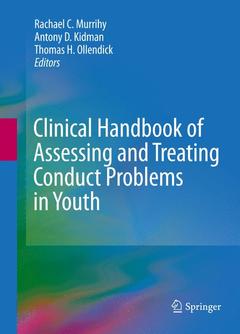Clinical Handbook of Assessing and Treating Conduct Problems in Youth, 2010
Coordonnateurs : Murrihy Rachael C., Kidman Antony D., Ollendick Thomas H.

Conduct problems, particularly oppositional defiant disorder (ODD) and conduct disorder (CD), are the most common mental health problems affecting children and adolescents. The consequences to individuals, families, and schools may be severe and long-lasting. To ameliorate negative outcomes and ensure the most effective treatment for aggressive and antisocial youth, early diagnosis and evidence-based interventions are essential.
Clinical Handbook of Assessing and Treating Conduct Problems in Youth provides readers with both a solid grounding in theory and a comprehensive examination of the evidence-based assessment strategies and therapeutic practices that can be used to treat a highly diverse population with a wide range of conduct problems. It provides professional readers with an array of evidence-based interventions, both universal and targeted, that can be implemented to improve behavioral and social outcomes in children and adolescents.
This expertly written resource:
- Lays the foundation for understanding conduct problems in youth, including epidemiology, etiology, and biological, familial, and contextual risk factors.
- Details the assessment process, with in-depth attention to tools, strategies, and differential diagnosis.
- Reviews nine major treatment protocols, including Parent-Child Interaction Therapy (PCIT), multisystemic therapy (MST) for adolescents, school-based group approaches, residential treatment, and pharmacotherapy.
- Critiques the current generation of prevention programs for at-risk youth.
- Explores salient issues in working effectively with minority youth.
- Offers methods for evaluating intervention programs, starting with cost analysis.
This volume serves as a one-stop reference for all professionals who seek a solid grounding in theory as well as those who need access to evidence-based assessment and therapies for conduct problems. It is a must-have volumefor anyone working with at-risk children, including clinical child, school, and developmental psychologists; forensic psychologists; social workers; school counselors and allied professionals; and medical and psychiatric practitioners.
PART I: AN INTRODUCTION TO OPPOSITIONAL DEFIANT DISORDER AND CONDUCT DISORDER: CLASSIFICATION, EPIDEMIOLOGY AND ETIOLOGY.- Phenomenology of Oppositional Defiant Disorder and Conduct Disorder.- Conduct problems in youth: A sociological perspective.- Etiology of ODD and CD: Biological, familial and environmental risk factors identified in the development of disruptive behaviour disorders.- Integrating etiological factors in ODD and CD: A transactional model.- Devising a treatment plan: Assessment, differential diagnosis and functional analysis for treatment formulation.- PART II: EVIDENCE-BASED TREATMENTS OF CONDUCT PROBLEMS: AN APPLIED APPROACH FOR PRACTITIONERS.- An Overview of evidence-based treatment for preschoolers, children, and adolescents with ODD and CD (indicated interventions).- Parent Child Interaction Therapy for preschool children with conduct problems.- Parent Management Programs for Children.- Cognitive behaviour therapy for the group-based treatment of oppositional youth.- Functional family therapy.- Multisystemic Therapy for the treatment of behaviorally disturbed adolescents.- Aggression management programs for youth in alternative school settings.- Residential and hospital treatment centers for children and adolescents with conduct problems.- Alternative treatments for conduct problems: Wilderness and boot camps.- Pharmacology for children and adolescents with ODD and CD.- Case Studies.- PART III: LOOKING FORWARD: PREVENTION PROGRAMS AND ADVANCED TREATMENT CONSIDERATIONS.- Prevention: Early intervention programs for universal and selected populations.- Treating children and adolescents with disruptive behavior disorders from ethnically diverse backgrounds.- Evidence-based treatment programs for conduct problems: Are they cost effective?.- Epilogue: Future directions in research and practice for disruptive behavior disorders.
Rachael C. Murrihy, PsyD. Dr. Murrihy is currently Senior Clinical Psychologist and Research Associate at the Health Psychology Unit, an adolescent-focused unit, at the University of Technology, Sydney, Australia. Dr Murrihy’s specialty is in the area of clinical adolescent psychology. She has extensive experience lecturing, training, and supervising professionals in this field, including clinical psychologists, psychiatrists, family physicians, nurses, educators, and interns. She also provides mental health lectures for members of the general public. As a practicing clinician, Dr Murrihy works with youth experiencing both internalizing and externalizing disorders across a diverse range of settings, including the university clinic, private practice, inpatient wards, and in mainstream and alternative schools. She has published research on adolescent mental health and has presented this work at conferences, both nationally and internationally. She has held research grants from the Australian Psychological Society, New South Wales (NSW) Department of Health, and the NSW Department of Education and Training. Her research and clinical interests include the assessment and treatment of youth with conduct problems, callous-unemotional traits in youth, cyber bullying and indirect bullying, and Cognitive Behavioral Therapy for early psychosis.
Antony D. Kidman, PhD. Dr. Kidman is a Clinical Psychologist and Director of the Health Psychology Unit of the University of Technology, Sydney, Australia. He has more than 140 scholarly publications to his name including seven books: Tactics for Change; Managing Love and Hate; Family Life, Adapting to Change; Feeling Better, a Guide to Mood Management; From Thought to Action; Stress, Coping and Social Support in the Age of Anxiety, and Schizophrenia, a Guide for Families. Dr Kidman was a member of the National Executive of the Australian college of clinical psychologists for 10 years and was the founderand inaug
Date de parution : 10-2012
Ouvrage de 544 p.
17.8x25.4 cm
Date de parution : 09-2010
Ouvrage de 544 p.
17.8x25.4 cm



